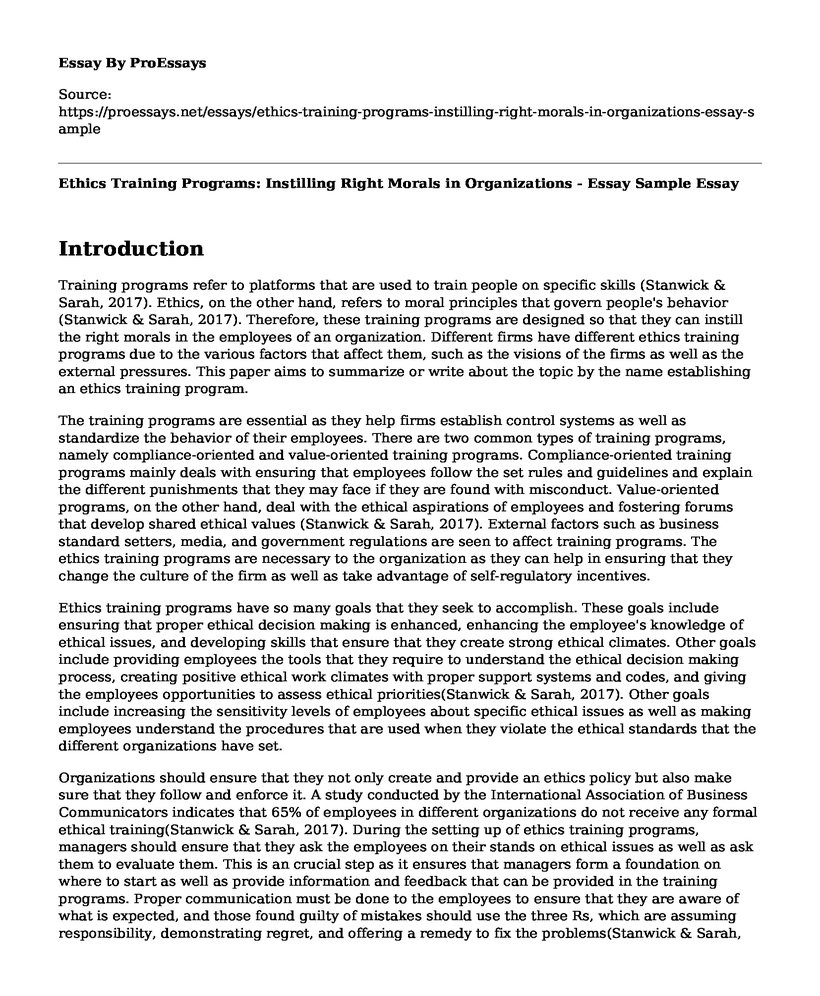Introduction
Training programs refer to platforms that are used to train people on specific skills (Stanwick & Sarah, 2017). Ethics, on the other hand, refers to moral principles that govern people's behavior (Stanwick & Sarah, 2017). Therefore, these training programs are designed so that they can instill the right morals in the employees of an organization. Different firms have different ethics training programs due to the various factors that affect them, such as the visions of the firms as well as the external pressures. This paper aims to summarize or write about the topic by the name establishing an ethics training program.
The training programs are essential as they help firms establish control systems as well as standardize the behavior of their employees. There are two common types of training programs, namely compliance-oriented and value-oriented training programs. Compliance-oriented training programs mainly deals with ensuring that employees follow the set rules and guidelines and explain the different punishments that they may face if they are found with misconduct. Value-oriented programs, on the other hand, deal with the ethical aspirations of employees and fostering forums that develop shared ethical values (Stanwick & Sarah, 2017). External factors such as business standard setters, media, and government regulations are seen to affect training programs. The ethics training programs are necessary to the organization as they can help in ensuring that they change the culture of the firm as well as take advantage of self-regulatory incentives.
Ethics training programs have so many goals that they seek to accomplish. These goals include ensuring that proper ethical decision making is enhanced, enhancing the employee's knowledge of ethical issues, and developing skills that ensure that they create strong ethical climates. Other goals include providing employees the tools that they require to understand the ethical decision making process, creating positive ethical work climates with proper support systems and codes, and giving the employees opportunities to assess ethical priorities(Stanwick & Sarah, 2017). Other goals include increasing the sensitivity levels of employees about specific ethical issues as well as making employees understand the procedures that are used when they violate the ethical standards that the different organizations have set.
Organizations should ensure that they not only create and provide an ethics policy but also make sure that they follow and enforce it. A study conducted by the International Association of Business Communicators indicates that 65% of employees in different organizations do not receive any formal ethical training(Stanwick & Sarah, 2017). During the setting up of ethics training programs, managers should ensure that they ask the employees on their stands on ethical issues as well as ask them to evaluate them. This is an crucial step as it ensures that managers form a foundation on where to start as well as provide information and feedback that can be provided in the training programs. Proper communication must be done to the employees to ensure that they are aware of what is expected, and those found guilty of mistakes should use the three Rs, which are assuming responsibility, demonstrating regret, and offering a remedy to fix the problems(Stanwick & Sarah, 2017).
Effective ethics training programs are critical in ensuring that ethical awareness is increased to all employees in all levels of the organization (Stanwick & Sarah, 2017). To create effective training programs, the following methods should be observed. Writing codes of conduct in simple terms ensure that everyone understands the program and therefore making it effective. Other ways to make it effective include encouraging commitment by senior managers, properly clarifying the objectives of the training programs, ensuring that ethical policies are not one-sided as well as disciplining employees who are guilty of ethical violations. Genuineness, relevancy, and reality of the ethical policies should be seen as well as ensuring that all the employees are aware of their roles in the ethical climate in the organization (Stanwick & Sarah, 2017).
References
Amazon.com: Understanding Business Ethics eBook: Peter A. Stanwick, Sarah D. Stanwick: Kindle Store. (n.d.). Retrieved from https://www.amazon.com/Understanding-Business-Ethics-Peter-Stanwick-ebook-dp-B07C6JJGQ5/dp/B07C6JJGQ5/ref=mt_kindle?_encoding=UTF8&me=&qid=1574029552
Stanwick, Peter A., and Sarah D. Stanwick. 2017. Understanding Business Ethics, Third Edition. Thousand Oaks, CA: SAGE Publications. ISBN: 9781506303239
Cite this page
Ethics Training Programs: Instilling Right Morals in Organizations - Essay Sample. (2023, Mar 14). Retrieved from https://proessays.net/essays/ethics-training-programs-instilling-right-morals-in-organizations-essay-sample
If you are the original author of this essay and no longer wish to have it published on the ProEssays website, please click below to request its removal:
- "Borders" Analysis Essay
- Comparison and Contrast Between Rene Descartes and John Locke on Self, Identity, and Consciousness
- Effective Management Techniques for Organizational Success - Essay Sample
- Essay Sample on Small-Medium Enterprises: Driving Economic Growth
- Essay Example on the Aptest Product Development Cycle: Suttle's NPD Methodology
- Essay Example on Bad Customer Service? Here's How to Fix It
- Paper Example on Marketing Mix: Product, Price, Place & Consumers' Behavior







